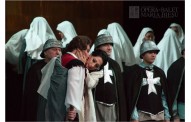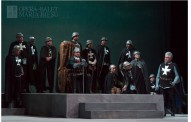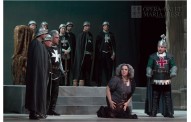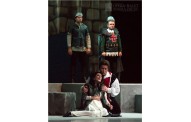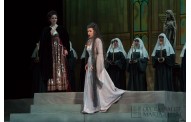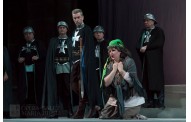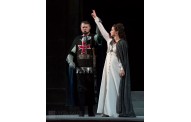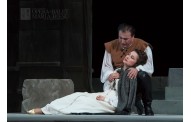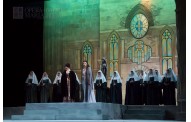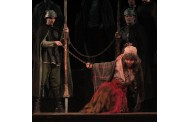
ACT I
The Duel
A hall in the Aliaferia Palace, Aragon.
Ferrando, captain of the Count di Luna's guard, warns the retainers to watch for Count's rival in love, the Troubadour. To keep them awake during their vigil, he tells the story of how a gypsy, years ago, cast a spell on the Count's infant brother, making him ill. Their father burned the gypsy at the stake for witchcraft. To avenge her death, the gypsy's daughter kidnapped the baby and burned him to death in the same spot where her mother had died. Ferrando has sworn to continue the search for the gypsy's daughter. As the clock strikes midnight, the frightened men rush off, cursing the gypsy.
The Palace Gardens.
Leonora, a lady-in-waiting to the Queen, is walking with her companion, Ines. Leonora is pining for a mysterious knight who appeared at a tournament and whom Leonora crowned with the victor's laurels. When civil war came, she did not see him for a long time. Then, one moonlit night, she heard a troubadour serenading her: it was he ("Tacea la notte placida"). Ines urges her to forget him, but she cannot, for she is so in love with him that she would die for him ("Di tale amor"). When they retire, the Count arrives. He is in love with Leonora, and is about to go to her when he hears the voice of his romantic and political rival, the Troubadour Manrico, serenading her. Enraged, he hides and watches Leonora rush down to meet her lover. Then he reveals himself and demands to know how Manrico dares to enter the palace precincts when he is already under a death sentence. The men rush off with swords drawn as Leonora falls in a faint.
ACT II
The Gypsy.
A gypsy camp in the mountains of Biscaya.
A group of gypsies work at their anvils, singing a song about a gypsy maid ("Anvil Chorus"). Azucena, Manrico's mother, then sings a song about a woman who was burned at the stake ("Stride la vampa"). When the gypsies leave, Azucena tells Manrico the true story behind the song, the story of his grandmother's terrible death at the hands of the previous Count di Luna ("Condotta ell'era in ceppi"). She remembers her mother's dying cry, "mi vendica" ("avenge me"), and recalls how, to avenge her mother, she kidnapped the previous Count's infant son, but by mistake threw her own baby into the flames. Manrico exclaims that he is not her son, then, but she hastily assures him that he is. She reminds him of how she nursed his wounds after his recent duel with the present Count, and wonders why Manrico did not kill him. He cannot explain it; he only knows that some mysterious force stayed his hand ("Mal reggendo all'aspro assalto"). Azucena urges him to kill the Count if he gets another chance, and Manrico swears to do so. A messenger arrives with a letter informing Manrico that his men have taken the town of Castellor, and that, believing Manrico to be dead, Leonora has decided to enter a convent there. Manrico rushes to Leonora as Azucena vainly tries to stop him.
Outside the convent at Castellor.
The Count, Ferrando, and the retainers have arrived to intercept Leonora. The Count believes Manrico to be dead and vows that Leonora will be his ("Il balen del suo sorriso"). As the church bell rings, the Count orders Ferrando and the others to hide. Not even God can take Leonora from him, he says, as the sound of the nuns' voices in prayer is heard ("Per me ora fatale"). Leonora, Ines, and a group of women arrive. Leonora consoles her friends, commending herself to God in hopes of meeting Manrico in the afterlife. But the Count bursts in on her, demanding that she marry him. At that, Manrico appears. Leonora is stunned by disbelief and joy as the two men and their retainers threaten each other ("E deggio e posso crederlo?"). Manrico's followers disarm the Count, allowing the Troubadour to flee with Leonora.
ACT III
The Gypsy's Son.
Count di Luna's military camp.
The soldiers are looking forward to the attack on Castellor ("Squilli, echeggi la tromba guerriera"). The Count is obsessed with the idea of Leonora in Manrico's arms. Ferrando arrives with the news that a gypsy has been found wandering near the camp. Azucena, bound, is brought in by the guards. The Count interrogates her, suspecting that she is the gypsy who years before murdered his infant brother. Although Azucena denies it, Ferrando identifies her. The Count is triumphant, and when she cries out to Manrico to save her, he is even more delighted to discover his enemy's mother is in his power. She warns the Count that God will punish him, but the Count relishes the idea of torturing Manrico by torturing his mother, thus exacting complete revenge for his brother's death ("Deh, rallentate, o barbari"). Azucena is dragged off, condemned to die at the stake.
A hall at Castellor.
Manrico tells Leonora that the Count will attack at dawn, but promises to conquer him. He asks his follower, Ruiz, to make everything ready for the battle while he and Leonora marry in the nearby chapel. The loving pair are about to enter the chapel when Ruiz hurriedly returns with the news that Azucena has been captured and is about to be burned. Manrico swears to save his mother from the flames, or else die with her ("Di quella pira").
ACT IV
The Torture.
Outside a tower of the Aliaferia Palace.
Ruiz tells Leonora that Manrico is imprisoned there. She implores the wind to take her sighs of love to him ("D'amor sull'ali rosee"). At the doleful sound of monks at prayer, Leonora shivers, then hears Manrico crying out farewell to her ("Miserere"). She vows to save his life. Then the Count enters with some of his retainers; she hides in the shadows. The Count orders that at dawn, Manrico is to be beheaded, and Azucena burned at the stake. He blames Leonora for driving him to this extreme, for he has searched Castellor for her in vain. She suddenly appears, however, and begs for mercy for Manrico. But the more she expresses her love for Manrico, the more enraged the Count becomes. Then she offers herself to him if he will spare Manrico. He makes her swear that she will do it, and she does, but secretly drinks poison concealed in her ring. The Count agrees to let Manrico live and takes her into the tower.
A dungeon in the palace.
Azucena, gravely ill, relives her mother's execution as Manrico tries to calm her. She dreams that they will go back to their old peaceful life in the mountains ("Ai nostri monti"). When Azucena falls asleep, Leonora enters with the news that he is saved. She urges him to flee, but she cannot come with him. Manrico refuses to leave without her, then accuses her of having sold herself to the Count. When he curses her, she reveals that she has poisoned herself. He is overcome with remorse. She dies just as the Count enters. He orders his soldiers to take Manrico to the block. When Azucena awakes, asking for Manrico, the Count drags her to the window to watch her son's execution. She then reveals to the horrified Count that Manrico was his brother: Her mother is avenged.
Original name: ll Trovatore
Libretto: Salvatore Cammarano and Leone Emanuele Bardare
After the drama "El trovador" by Antonio Garcia Gutierrez
Directed by: Mihai Timofti, Master in Art
Scenography: Ludmila Furdui, Master in Art
Costume: Constantin Lodzeiski
World premiere: January 19, 1853, at the Apollo Theater in Rome.
Premiere in Chisinau: November 15, 1969, at the Moldovan State Theater of Opera and Ballet
Premiere of the current version: June 7, 2013, "Maria Biesu" National Opera and Ballet Theater
Duration of the show: 3 hours (two breaks)
The opera is presented in Italian
Romanian subtitles

